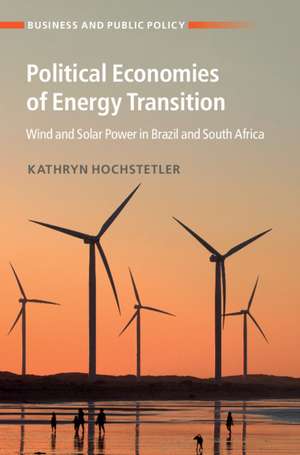Political Economies of Energy Transition: Wind and Solar Power in Brazil and South Africa: Business and Public Policy
Autor Kathryn Hochstetleren Limba Engleză Hardback – 25 noi 2020
| Toate formatele și edițiile | Preț | Express |
|---|---|---|
| Paperback (1) | 200.05 lei 3-5 săpt. | +15.17 lei 4-10 zile |
| Cambridge University Press – 21 mar 2024 | 200.05 lei 3-5 săpt. | +15.17 lei 4-10 zile |
| Hardback (1) | 600.84 lei 6-8 săpt. | |
| Cambridge University Press – 25 noi 2020 | 600.84 lei 6-8 săpt. |
Din seria Business and Public Policy
-
 Preț: 200.05 lei
Preț: 200.05 lei -
 Preț: 280.53 lei
Preț: 280.53 lei - 11%
 Preț: 581.22 lei
Preț: 581.22 lei -
 Preț: 285.37 lei
Preț: 285.37 lei -
 Preț: 236.78 lei
Preț: 236.78 lei -
 Preț: 286.13 lei
Preț: 286.13 lei -
 Preț: 429.00 lei
Preț: 429.00 lei - 14%
 Preț: 695.95 lei
Preț: 695.95 lei -
 Preț: 252.59 lei
Preț: 252.59 lei -
 Preț: 301.92 lei
Preț: 301.92 lei -
 Preț: 284.98 lei
Preț: 284.98 lei -
 Preț: 284.17 lei
Preț: 284.17 lei -
 Preț: 287.66 lei
Preț: 287.66 lei - 11%
 Preț: 630.49 lei
Preț: 630.49 lei -
 Preț: 284.56 lei
Preț: 284.56 lei -
 Preț: 225.58 lei
Preț: 225.58 lei - 11%
 Preț: 582.34 lei
Preț: 582.34 lei -
 Preț: 238.34 lei
Preț: 238.34 lei -
 Preț: 231.44 lei
Preț: 231.44 lei - 32%
 Preț: 543.25 lei
Preț: 543.25 lei
Preț: 600.84 lei
Preț vechi: 675.11 lei
-11% Nou
Puncte Express: 901
Preț estimativ în valută:
114.97€ • 120.34$ • 95.69£
114.97€ • 120.34$ • 95.69£
Carte tipărită la comandă
Livrare economică 01-15 aprilie
Preluare comenzi: 021 569.72.76
Specificații
ISBN-13: 9781108843843
ISBN-10: 1108843840
Pagini: 270
Ilustrații: 10 b/w illus. 2 tables
Dimensiuni: 235 x 160 x 20 mm
Greutate: 0.56 kg
Editura: Cambridge University Press
Colecția Cambridge University Press
Seria Business and Public Policy
Locul publicării:Cambridge, United Kingdom
ISBN-10: 1108843840
Pagini: 270
Ilustrații: 10 b/w illus. 2 tables
Dimensiuni: 235 x 160 x 20 mm
Greutate: 0.56 kg
Editura: Cambridge University Press
Colecția Cambridge University Press
Seria Business and Public Policy
Locul publicării:Cambridge, United Kingdom
Cuprins
1. Political economies of energy transition in Brazil and South Africa; 2. Wind and solar power in the transition to a low-carbon economy; 3. States, markets, and energy transition: good industrial policy?; 4. Electricity consumption in Brazil and South Africa: distribution and prices; 5. People and place: siting wind and solar plants in Brazil and South Africa; 6. Political economies of energy transition.
Recenzii
'Hochstetler's book takes a comprehensive look at two emerging economies that are in the midst of complex and contested energy transitions. An important and timely contribution, it provides valuable insights for the next generation of renewable energy adopters as we move into the decisive decade for transitioning to a low carbon energy system and mitigating climate change.' Joanna Lewis, Provost's Distinguished Associate Professor and Director, Science, Technology and International Affairs Program, Georgetown University
'Will efforts at a renewable energy transition in emerging economies lead to a green spiral or a negative spiral? Hochstetler's major new book develops a sophisticated framework to understand this question built around exploring climate politics, distributional politics, industrial policy and siting conflicts. Her work is a major conceptual advance in understanding energy and climate politics in the developing world, and a rich empirical treatment of the political economy of energy in South Africa and Brazil.' Navroz K. Dubash, Professor, Centre for Policy Research, New Delhi
'By one of the top scholars of political economy of development, this book masterfully compares solar and wind energy and their divergent development trajectories in Brazil and South Africa. Rather than by coherent plan, the shift to renewable energy is more likely, as Hochstetler deftly shows, to involve a series of political struggles by contending coalitions across different policy frames and types of renewable energy. Political Economies of Energy Transition is indispensable reading for students of renewable energy, climate change, and development policy generally.' Ben Ross Schneider, Ford International Professor of Political Science, Massachusetts Institute of Technology
'Will efforts at a renewable energy transition in emerging economies lead to a green spiral or a negative spiral? Hochstetler's major new book develops a sophisticated framework to understand this question built around exploring climate politics, distributional politics, industrial policy and siting conflicts. Her work is a major conceptual advance in understanding energy and climate politics in the developing world, and a rich empirical treatment of the political economy of energy in South Africa and Brazil.' Navroz K. Dubash, Professor, Centre for Policy Research, New Delhi
'By one of the top scholars of political economy of development, this book masterfully compares solar and wind energy and their divergent development trajectories in Brazil and South Africa. Rather than by coherent plan, the shift to renewable energy is more likely, as Hochstetler deftly shows, to involve a series of political struggles by contending coalitions across different policy frames and types of renewable energy. Political Economies of Energy Transition is indispensable reading for students of renewable energy, climate change, and development policy generally.' Ben Ross Schneider, Ford International Professor of Political Science, Massachusetts Institute of Technology
Notă biografică
Descriere
Shows that economic concerns about jobs, costs, and consumption, rather than climate change, are likely to drive energy transition in developing countries.
